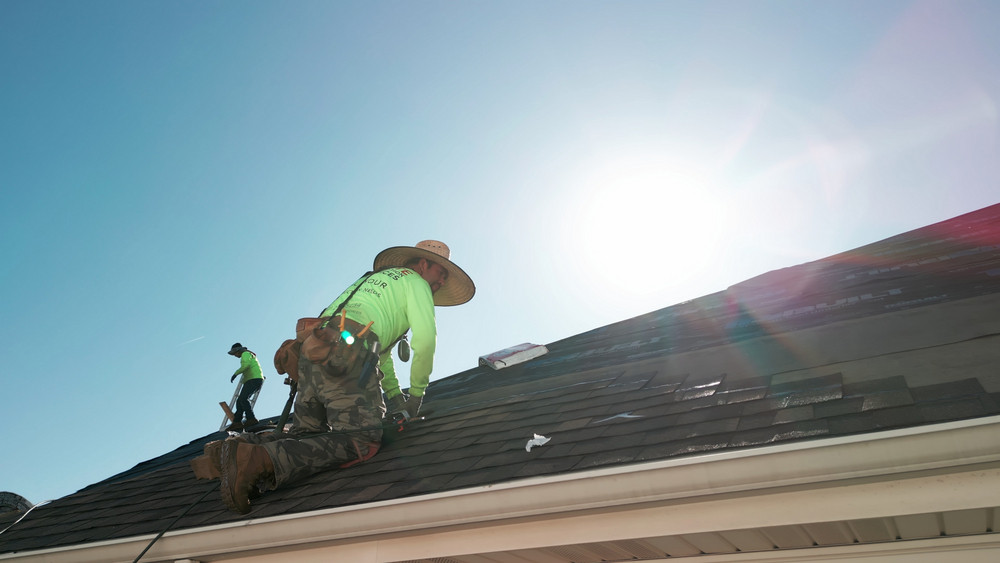Highlights:
- Licensing Requirements: In Illinois, residential roofing contractors must hold either a Limited (residential, up to eight units) or Unlimited roofing license issued by IDFPR; this includes passing exams, carrying bond, insurance, and designating a qualifying party.
- Free Quotes & Estimates: A reliable contractor offers no-obligation, detailed estimates outlining roof type, size, materials, labor, tear-off, permit costs, and optional upgrades—empowering homeowners to compare proposals.
- Materials & Installation Standards: Ask about shingle type, underlayment, ventilation, flashing, and code compliance; proper air flow and moisture prevention are critical to roof longevity.
- Insurance, Bonding & Warranty: Contractors must maintain general liability, workers’ comp, and a surety bond ($10K limited / $25K unlimited); homeowners should also confirm manufacturer and workmanship warranty coverage.
- Timeline & Project Management: Most full roof replacements take 1–3 days; inspections, weather delays, or decking repairs can extend the schedule. Ask upfront for start date, projected finish, and contingency plans.
- Questions to Vet Contractors: Key inquiries include license type, bond and insurance documentation, warranty terms, project timeline, and who handles permits and inspections.

What Licensing and Regulatory Credentials Should Urbana Contractors Hold?
In Illinois, roofing contractors must be licensed under the Illinois Roofing Industry Licensing Act via IDFPR. Residential-only practitioners need a Limited Roofing License (for projects up to eight dwelling units), while those serving commercial, industrial, or larger residential structures must hold an Unlimited License. Both require: passing the relevant state exam, securing a surety bond ($10,000 for limited, $25,000 for unlimited), and maintaining liability and workers’ comp insurance. The contractor must designate a qualifying party responsible for license upkeep and supervision, and any changes must be reported within 30 days to IDFPR. These credentials safeguard homeowners by ensuring legally compliant, professionally supervised roofing services.
How do Free Quotes Help Homeowners Make Informed Decisions?
Free, accurate quotes are fundamental to homeowner confidence. A no-cost estimate should outline project scope, materials, tear-off and disposal fees, labor hours, permit processing, and recommended upgrades like ventilation or underlayment enhancements. A comprehensive estimate illuminates cost drivers—such as roof pitch, access restrictions, or waste handling—and lets you compare proposals objectively. Reliable contractors also clarify exclusions and outline payment schedules tied to project milestones. Avoid vague or verbal-only estimates; written clarity can prevent misunderstandings and price hikes later. Ultimately, transparent free quotes help you budget and select the best contractor for your needs.
What Roofing Materials and Installation Practices Matter Most?
The quality of materials and installation directly influences your roof’s performance and lifespan. Ask contractors about shingle type (architectural vs. 3‑tab), underlayment (synthetic or ice‑water barrier), ventilation strategies (ridge, soffit, or power vents), and flashing details around chimneys, valleys, and edges. Building codes and manufacturers’ instructions dictate proper fastener spacing, overlap, and ventilation ratios—these factors prevent moisture buildup, ice dams, and premature deterioration. Well-installed systems reduce long-term repair costs and improve resale value. Don’t hesitate to request a detailed job walk-through: knowledgeable contractors will explain material choices and installation steps thoroughly.
If you’re replacing siding at the same time, it’s also important to ask how the roofing and siding systems will be integrated to prevent water intrusion. Some contractors use upgraded shingles with extended wind warranties, which can be especially useful in central Illinois’s storm-prone climate. Choosing the right combination of products can also improve your home’s energy efficiency and help regulate indoor temperatures year-round. For homeowners in Urbana, investing in durable, climate-appropriate materials and proper installation isn’t just a matter of curb appeal—it’s a critical safeguard against costly weather damage over time.
Why Insurance, Bonding, and Warranties are Non-Negotiable
Protecting both the homeowner and crew, proper insurance and bonding are essential. Illinois law requires roofing contractors to carry general liability and workers’ compensation insurance, plus maintain a surety bond. For limited licenses, this bond is $10,000; for unlimited, it’s $25,000. Homeowners should ask to see current certificates. Beyond legal compliance, quality contractors provide manufacturer’s warranties (typically 25–50 years on shingles) and workmanship warranties (often 1–5 years). Verify what’s covered—such as leaks or material failure—and what voids warranties, like unauthorized modifications. Firm warranty terms reflect confidence and long-term accountability.
Source: Surety Bonds Direct
How Long Does a Roof Replacement Take, and What Affects the Timeline?
A typical full roof replacement on a standard single-family home in Urbana takes 1–3 days, weather permitting. Tear-off, decking repairs, and ventilation installation influence duration. Complicated rooflines with dormers, chimneys, or steep pitches may take longer. Post-installation inspections and permit sign-offs add additional time. Reliable contractors provide a start date, daily hours, and completion estimate up front. They also build weather contingencies into the schedule and communicate changes promptly. Clear timelines help homeowners plan around disruptions, like access to yards or covered outdoor areas, and reduce frustrations during installation.

Who Handles Permits, Inspections, and Code Compliance?
A well-reviewed residential roofing contractor in Urbana, IL that offers free quotes will be a trustworthy contractor and will manage municipal permits and scheduling of inspections with the City of Urbana. Roofing replacements typically require permits to ensure adherence to building codes concerning ventilation, fire ratings, underlayment, and structural requirements. Contractors should submit plans or diagrams if needed and inspect the permit requirements before starting. Homeowners should ask, “Will you secure the permits and coordinate the inspections?” Having the contractor manage these administrative steps avoids delays, fines, or code violations and reassures you that the work meets local and state safety standards.
What Warranties and Post-Install Care Should be Expected?
A reputable contractor offers multiple warranty layers:
- Manufacturer warranty on shingles or underlayment (often 25–50 years).
- Workmanship warranty, typically 1–5 years, covering installation defects and repair work.
- Proactive post-install services, such as final clean-up, gutter checks, and explaining ventilation or maintenance considerations.
- Maintenance advice, like attic vent evaluation or shingle inspection after storms.
Ensure all warranty terms are in writing with clear procedures for submitting a claim, responding timeframes, and items that void coverage (e.g., DIY roof penetrations). This clarity protects your investment and ensures future issues are addressed responsibly.
Questions Homeowners Should Ask When Interviewing Contractors
- What type of IDFPR roofing license do you hold?
- Can I see current insurance and surety bond certificates?
- Do you provide free, detailed written quotes?
- What shingle type and underlayment do you install, and how do you handle ventilation?
- Will you pull the permit and coordinate inspections?
- What is your project timeline, including weather contingencies?
- What warranties come with materials and labor?
- How do you handle cleanup and post-install walkthroughs?
These questions help establish credibility, ensure accountability, and align expectations between you and the contractor, reducing surprises during and after the project.
Choosing a Contractor You Can Trust
Securing a well-reviewed, reliable roofing contractor in Urbana, IL starts with verifying licensure—in particular, whether they hold a Limited or Unlimited license from IDFPR, backed by proper bonding and insurance. Demand free, comprehensive quotes that clearly outline costs and scope. Ensure materials and installation techniques comply with code and manufacturer standards, especially ventilation, underlayment, and flashing practices. Confirm that permits and inspections are professionally managed. Understand the full warranty structure and maintenance expectations, and get everything in writing to protect your home.
Source: ServiceTitan
By asking informed questions and reviewing credentials, you select not just a crew but a trusted partner capable of delivering a durable, code-compliant roof with clear pricing and reliable aftercare. With the right preparation, you’ll enjoy improved comfort, enhanced curb appeal, and lasting peace of mind knowing your investment is built to last.

